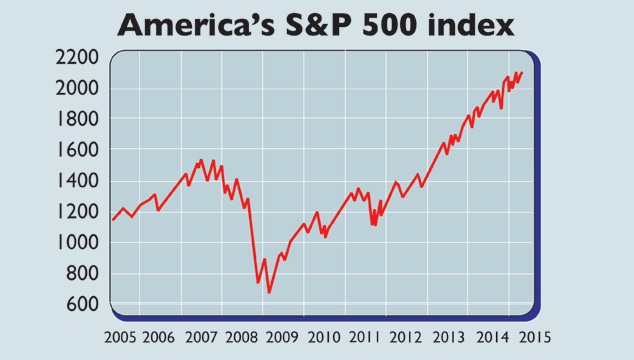US stocks heading for a slip
Despite the Nasdaq hitting a new high for the first time in 15 years, US stocks are overdue a correction.

Get the latest financial news, insights and expert analysis from our award-winning MoneyWeek team, to help you understand what really matters when it comes to your finances.
You are now subscribed
Your newsletter sign-up was successful
Want to add more newsletters?

Twice daily
MoneyWeek
Get the latest financial news, insights and expert analysis from our award-winning MoneyWeek team, to help you understand what really matters when it comes to your finances.

Four times a week
Look After My Bills
Sign up to our free money-saving newsletter, filled with the latest news and expert advice to help you find the best tips and deals for managing your bills. Start saving today!

American stocks just keep going, "like the Energizer bunny", says John Authers in the Financial Times. The Nasdaq has hit a new record for the first time in 15 years, and the S&P 500 keeps setting new all-time highs. Yet "the market is way overdue statistically for a correction" a drop of at least 10%, says Randy Frederick of Charles Schwab. And the fundamentals don't warrant any further progress.
Dwindling earnings plus rich valuations is an especially worrying combination, notes Switzerland's Finanz und Wirtschaft newspaper. First- and second-quarter profits are expected to fall compared with last year, the first so-called profits recession since the 2009 crisis.
Yet on 27 times cyclically adjusted earnings, the S&P is at its highest valuation since the 1990s bubble, or before the 1929 crash. That's because stocks have raced ahead of earnings and sales growth ever since the crisis, as Economist.com's Buttonwood blog notes.
MoneyWeek
Subscribe to MoneyWeek today and get your first six magazine issues absolutely FREE

Sign up to Money Morning
Don't miss the latest investment and personal finances news, market analysis, plus money-saving tips with our free twice-daily newsletter
Don't miss the latest investment and personal finances news, market analysis, plus money-saving tips with our free twice-daily newsletter
The market is around 35% above its 2007 high but earnings per share are up just 20%, and revenues per share (sales) are still at 2007 levels. So companies "have squeezed higher margins out of revenues, investors have awarded these higher margins a higher multiple, and all this has pushed shares higher". But high margins tend to revert to the mean, so are more likely to fall than rise.
So how has the market kept hitting new highs? Some companies have beaten lowered profit forecasts recently, and some steam has gone out of the US dollar rally a weaker dollar helps profits as S&P companies make half of their sales abroad. And while high valuations imply poorlong-term returns, they tell us nothing about the short term. The S&P went from extremely expensive to absurdly expensive in the late 1990s, before the bubble burst.
Investors have also been reassured thatthe first rise in interest rates now looks set for autumn rather than June. So the liquidity boost from zero interest rates endures. "The contorted logic of the past six years stays in place," says Authers. Stocks are pricey, but while rates are low and bonds are even more overvalued, money flows into equities. It might take "really bad earnings", a geopolitical upset, or a nasty surprise on the interest rates front, to "jolt" the market "out of its steady ascent".
Get the latest financial news, insights and expert analysis from our award-winning MoneyWeek team, to help you understand what really matters when it comes to your finances.

-
 Should you buy an active ETF?
Should you buy an active ETF?ETFs are often mischaracterised as passive products, but they can be a convenient way to add active management to your portfolio
-
 Power up your pension before 5 April – easy ways to save before the tax year end
Power up your pension before 5 April – easy ways to save before the tax year endWith the end of the tax year looming, pension savers currently have a window to review and maximise what’s going into their retirement funds – we look at how